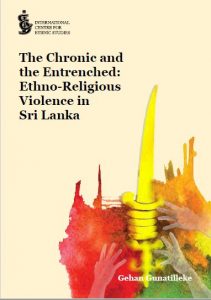Ethno-Religious Violence in Sri Lanka
 by Gehan Gunatilleke, International Centre for Ethnic Studies, Colombo, 2018
by Gehan Gunatilleke, International Centre for Ethnic Studies, Colombo, 2018…This study set out to establish the hypothesis that ethno-religious violence in Sri Lanka is ‘entrenched’ within cultural, socio-political and state structures, and requires radical interventions to overcome. It first reflected on the nature of communal violence in Sri Lanka, and invited a recalibration of how we understand such violence. It argued that violence between the Sinhala-Buddhist majority community and minority communities must be understood as part of a single ‘ethno-religious’ conflict, rather than separate ‘ethnic’ and ‘religious’ conflicts. In this context, the conflict in Sri Lanka bears features of both ‘ethnic’ and ‘religious’ conflicts. Moreover, the combined effects of these types of conflicts have produced uniquely intractable and ‘entrenched’ features that make resolving the ethnoreligious conflict in Sri Lanka particularly challenging.
The study then highlighted the fact that ethno-religious violence – particularly in its chronic form – has persisted even after the democratic transition of January 2015. Thus governmental change has had a limited impact in terms of ending ethnoreligious violence in the country. Meanwhile, new developments in the country including the mainstreaming of Sinhala-Buddhist militant groups, intra-community factionalism within the Muslim community, and the re-emergence of TamilHinduism have complicated and compounded ethno-religious tensions. The current intractable state of ethno-religious violence in Sri Lanka thus leads to the conclusion that it is in fact a deeply embedded part of our cultural and socio-political fabric. In this context, this study invited further reflection on the drivers that underlie the entrenchment of such violence.
Three vital drivers remain at the core of ethno-religious violence in Sri Lanka. First, the Sinhala-Buddhist community has undergone decades of socialisation that has led to a distinct entitlement complex. This complex has prompted many within this community to view themselves as the rightful owners and ‘hosts’ of Sri Lanka. Any serious threat to this hegemonic status by a minority community has been met with sharp resistance and has often led to violence. Second, global identities pertaining to Tamils, Christians and Muslims have engendered a ‘minority complex’ among Sinhala-Buddhists, who essentially see Sri Lanka as their only homeland. Thus local discourses – such as Tamil demands for autonomy, Christian proselytism, and Islamisation – have created existential fears among the Sinhala-Buddhist community. Such fears explain why the nationalist rhetoric of militant groups often resonates with Sinhala-Buddhists, and how ethno-religious tensions can so easily escalate to violence. Third, the Buddhist clergy remains a powerful socio-political force that state law is often subordinate to. This monastic exceptionalism has led to a culture of impunity, as law enforcement agencies have remained reluctant to hold perpetrators of ethno-religious violence to account – particularly at the local level where such violence is often at the behest of Buddhist monks. These three factors combine to entrench ethno-religious violence within cultural, socio-political and state structures in Sri Lanka.
This study reflected on an alternative approach to overcoming entrenched ethnoreligious violence in Sri Lanka. It pointed to the serious limitations of rule of law and state-centric human rights approaches to combating violence. Given that the state itself has embodied a majoritarian agenda, relying on the state alone to end ethno-religious violence is both ineffective and unsustainable. Instead, this study has recommended a process of cultural transformation through which coexistence is promoted at all levels. It also suggested that the vocabulary through which such a project is advanced be ‘resonant’. Thus ‘ordinary virtues’ and ‘widely-held values’ must be relied upon to convince both majority and minority communities of the importance and benefits of coexisting within a framework of religious freedom and equal citizenship. The goal of such a project is to transform the fundamental terms on which communities in Sri Lanka interact – from deep contestation and antagonism to reciprocity and mutual respect.